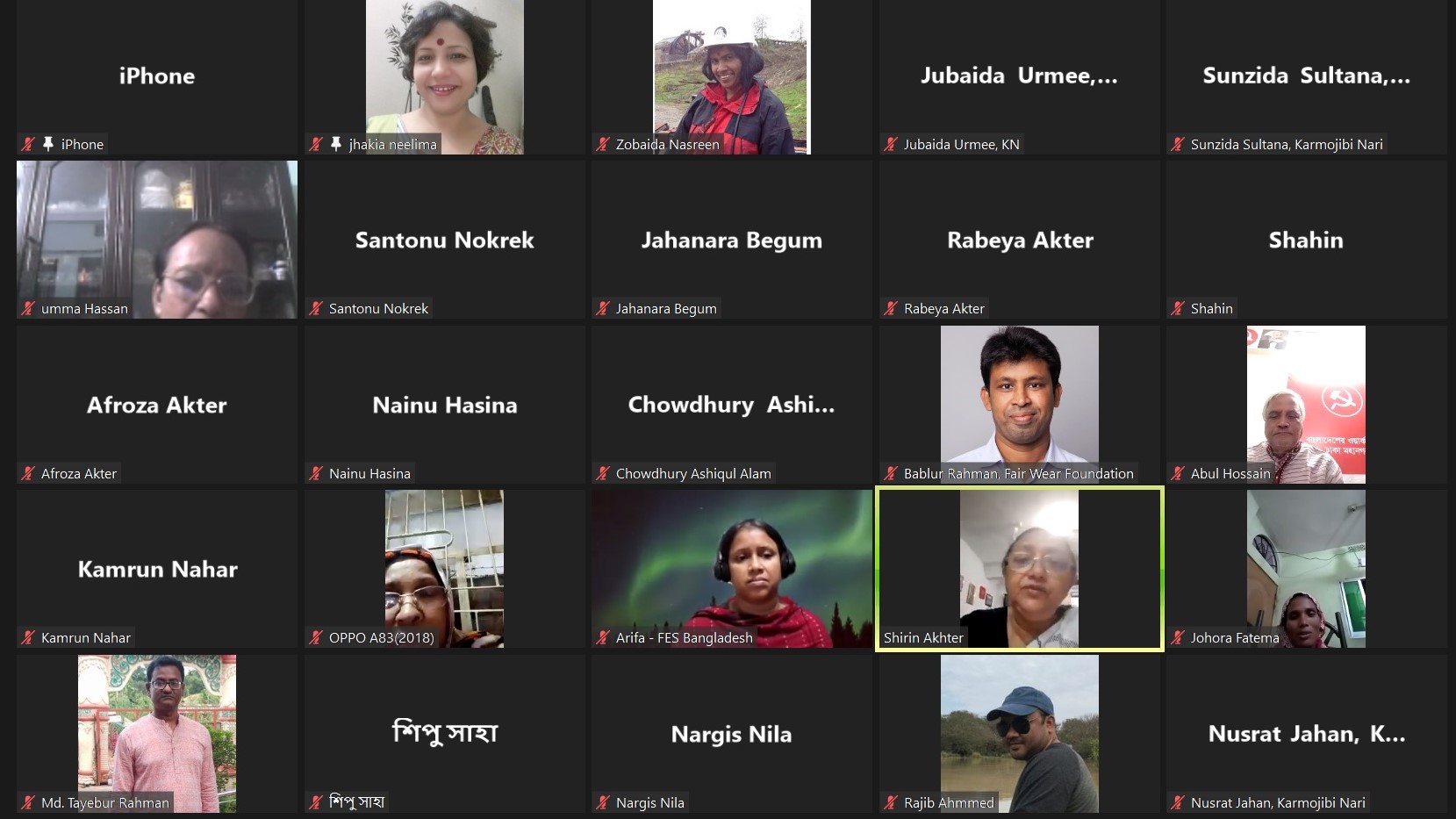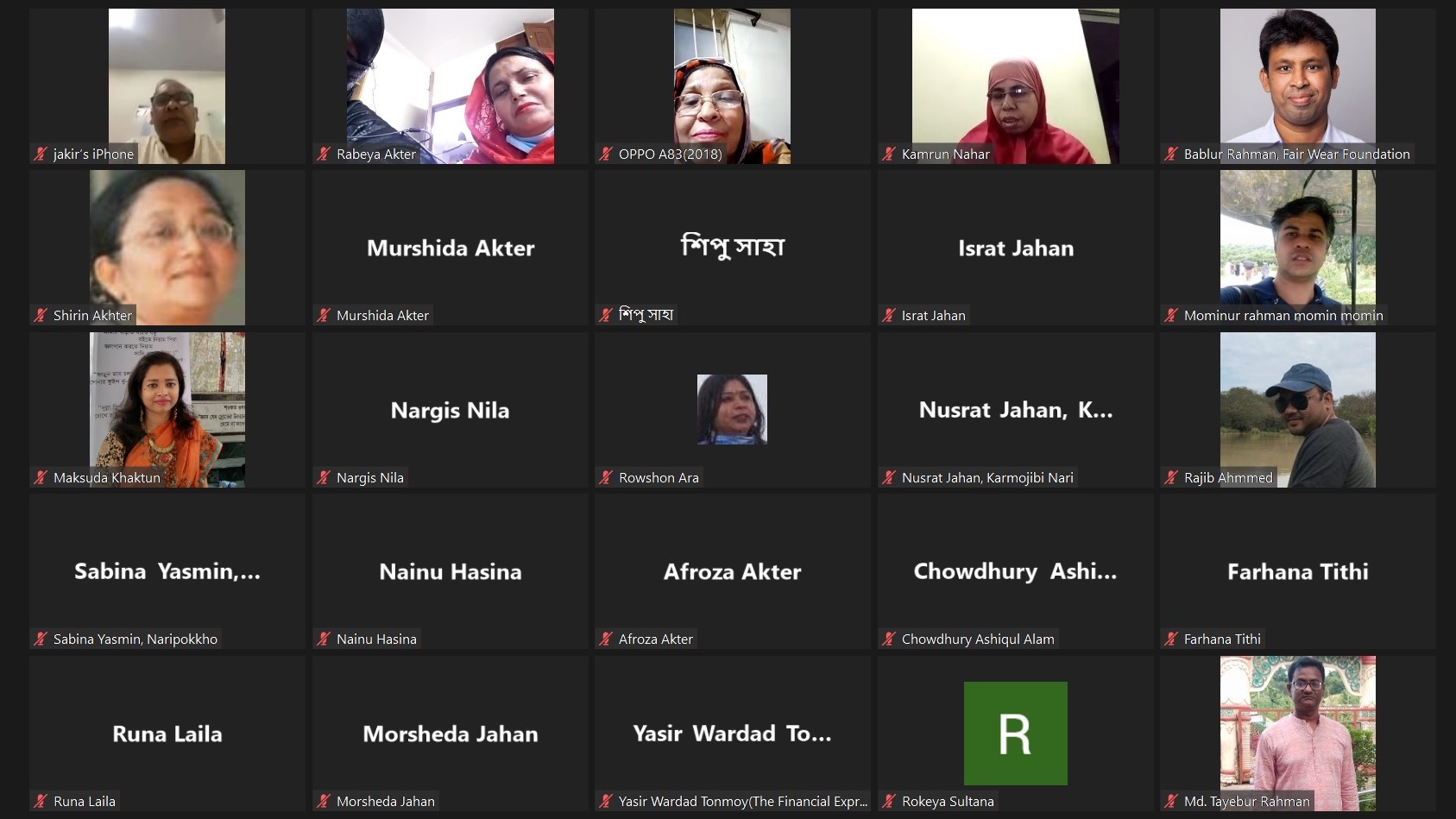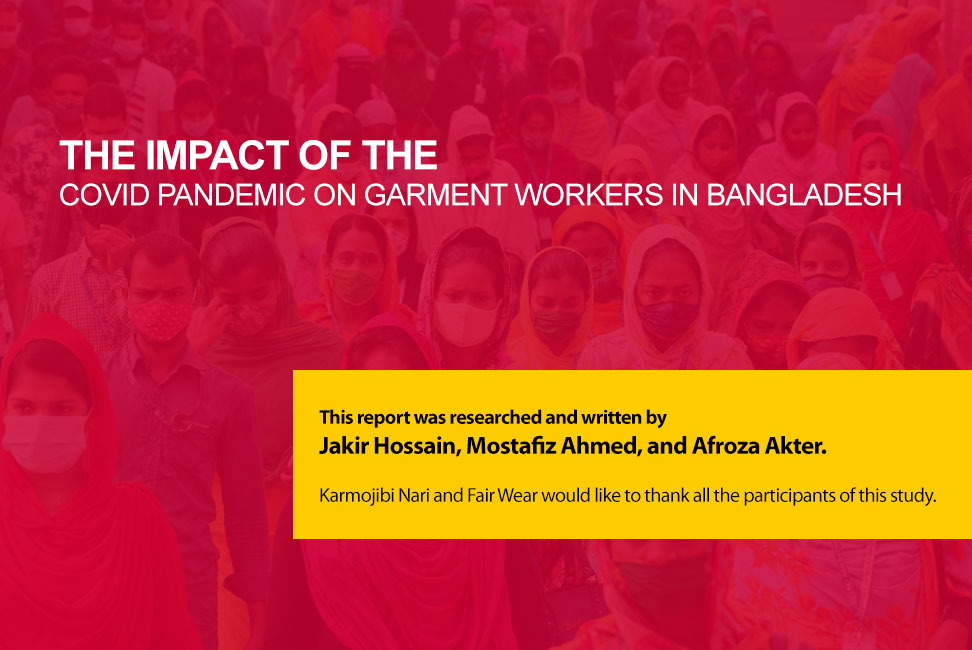
Dec 5, 2021 | Report
BACKGROUND: The Covid pandemic is profoundly affecting Bangladesh’s economy along with its labour market. The shutdown, or slowdown, of economic activities is impacting the income and livelihoods of the working people. Bangladesh’s largest export earning sector—ready-made garments (RMG)—is of no exception. Click For Details: PDF
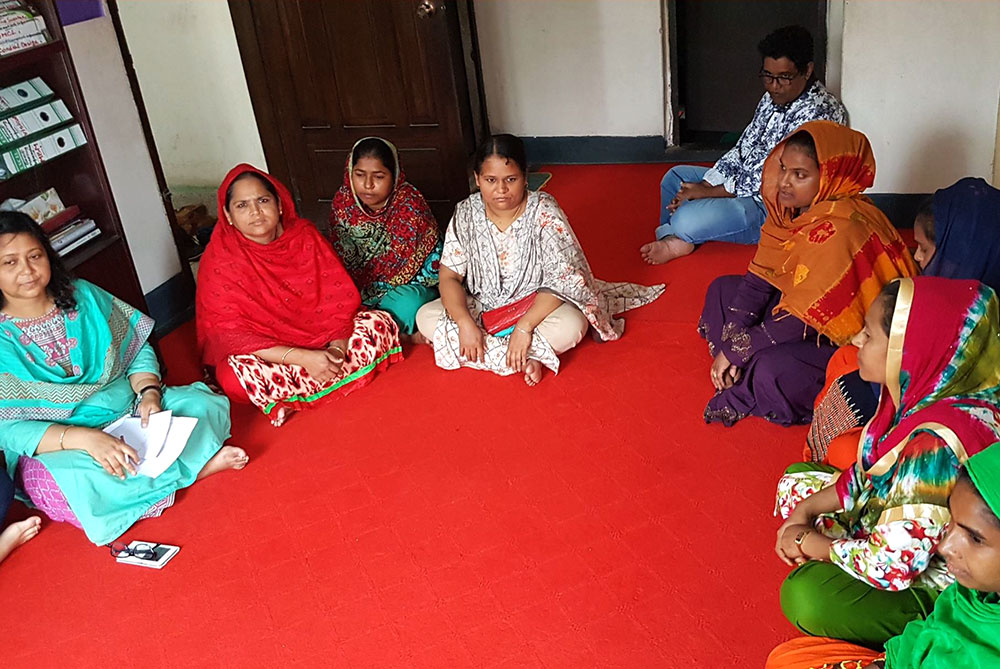
Dec 5, 2021 | Report
BACKGROUND: The readymade garments (RMG) industry in Bangladesh that was established in the 1980s has grown to such an extent that Bangladesh is today the second largest exporter of readymade garments in the world after China. Around 83.5% of the country’s total export earning comes from garments sector. Click For Details: PDF
Dec 4, 2021 | Research Works
Jakir Hossain, Mostafiz Ahmed, and Afroza Akter |Clicks for Details: PDF
Introduction
The vast majority of the labour force in Bangladesh is employed in the informal economy. In spite of good economic performance, the country is faced with growing informalization—an estimated 86% of the labour force is currently employed in the informal sector with an increase from around 79 percent in 2002.[1] Workers in the informal sector are characterized by varying degrees of exclusion, dependency and vulnerability resulting in a high number of working poor. The informal economy thrived in the context of high unemployment, underemployment, poverty, gender inequality and precarious work. It plays a significant role, especially in income generation, because of the relative ease of entry and low requirements for education, skills, technology and capital. But most people enter the informal economy not by choice, but out of a need to survive and to have access to basic income-generating activities. Truly, while the informal economy derives certain benefits such as livelihood, and large entrepreneurial potential, among others, the decent work deficit is a major concern.
Two major sectors of the informal economy—personal care workers, and non-clinical healthcare workers— are the focus of the study. Personal care workers in the country are those who are involved in beauty parlours providing makeup, spa, facial mud baths, haircutting, colouring, waxing, eyebrow shaping, pedicure & manicure, hair colouring, body wraps, haircut and oil massage.Personal care industries are worth USD 10 billion plus industry in Bangladesh, providing employment for an estimated 100,000 women in thousands of beauty-care service providers or beauty parlours/salons those have sprung up all over the country in thelast decade.[2] Non-clinical healthcare workers include ayas, ward boys, ward masters, stretcher bearers, and other occupations including cleaners, gatekeepers, MLSS and zamadars who make up the bulk of the human resource in the health sector of the country across the public and private spectrum. Clicks for Details: PDF
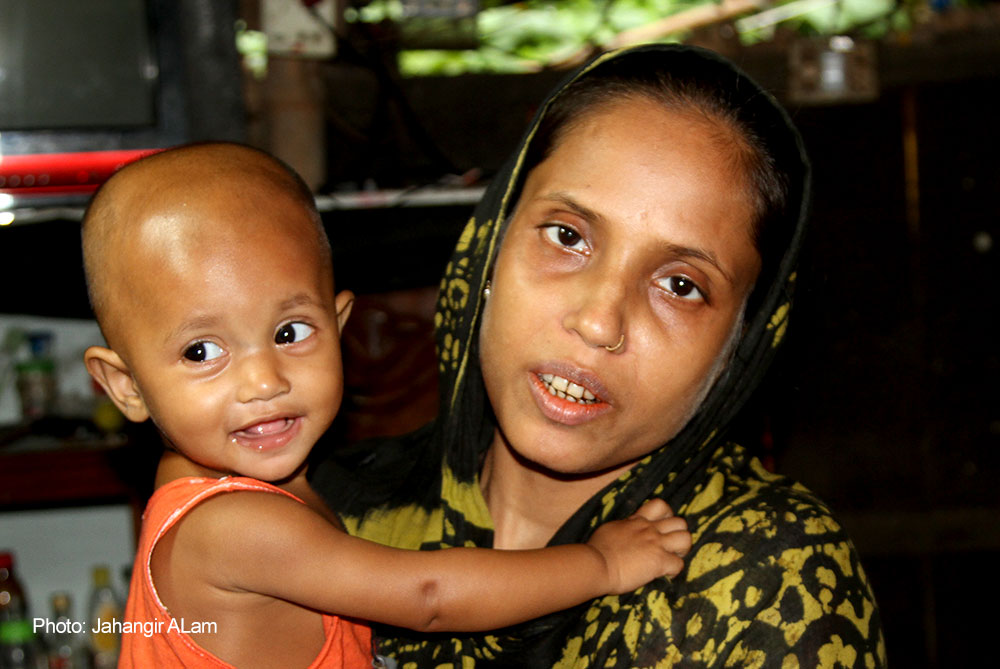
Nov 21, 2021 | Report
Jakir Hossain, Mostafiz Ahmed, and Afroza Akter | Click for PDF
Executive Summary
The objective of this watch report is to unearth the implementation status of the rights of women workers of RMG in Bangladesh and formulate a set of key actions for advocacy. To attain the objective, the study employed a mixed method approach. Quantitative data is drawn from questionnaire survey administered with 390 women workers (154 respondents from Dhaka, 116 respondents each from Gazipur, and Narayanganj). Qualitative information is drawn from three FGDs (one each in Dhaka, Gazipur, and Narayanganj) and KIIs with policymakers, gender expert, representatives of employers’ association, Trade unions, Civil Society Organization (CSO) and Labour Rights NGOs.
Bangladesh is obliged to uphold workers’ rights through the international workers’ rights and human rights instruments that include ILO conventions, Universal Declaration on Human Rights (UDHR), International Covenant on Civil and Political Rights (ICCPR), International Covenant on Economic Social and Cultural Rights (ICESCR), and Convention on Elimination of All Forms of Discrimination Against Women (CEDAW); and national legal and policy instruments comprise the Constitution, Bangladesh Labour Act (BLA) 2006, Bangladesh Labour Rules (BLR) 2015, National Occupational Safety and Health Policy (OSH Policy), National Labour Polcy (2012), Fire Prevention and Extinguishing Act 2003 (FPEA 2003), Bangladesh National Building Code 2006 (BNBC 2006), Penal Code and the verdict of the High Court.
Rights coverage of women workers of RMG has been examined based on both international and national standards in several broad areas—employment contract; workplace discrimination and harassment; working time, rest, and leave; welfare; social protection; and freedom of association and collective bargaining. This study finds positives changes in the legal instruments. However, there are gray areas also. In many areas there are considerable gaps and debates. The recent labour law amendment has significantly improved the issues of festival bonus, restricted employment of children under 14 years of age, has eased, to some extent, the condition of TU registration process, has included provisions on SOP and anti-union discrimination and has increased the amount of compensation (although not according to ILO convention). However, the amendment has also created tensions among the workers. It has created a scope to expand daily working hours; has not increased the maternity leave to make it consistent with government sector employees/workers; has retained precondition for TU formation; has created the scope of a reduction in benefits for compensatory leave and festival leave. Moreover, the law still misses specific provisions on accommodation, pension, medical allowance, rehabilitation, alternative skill development, violence against women at the workplace, and workers’ skill development.
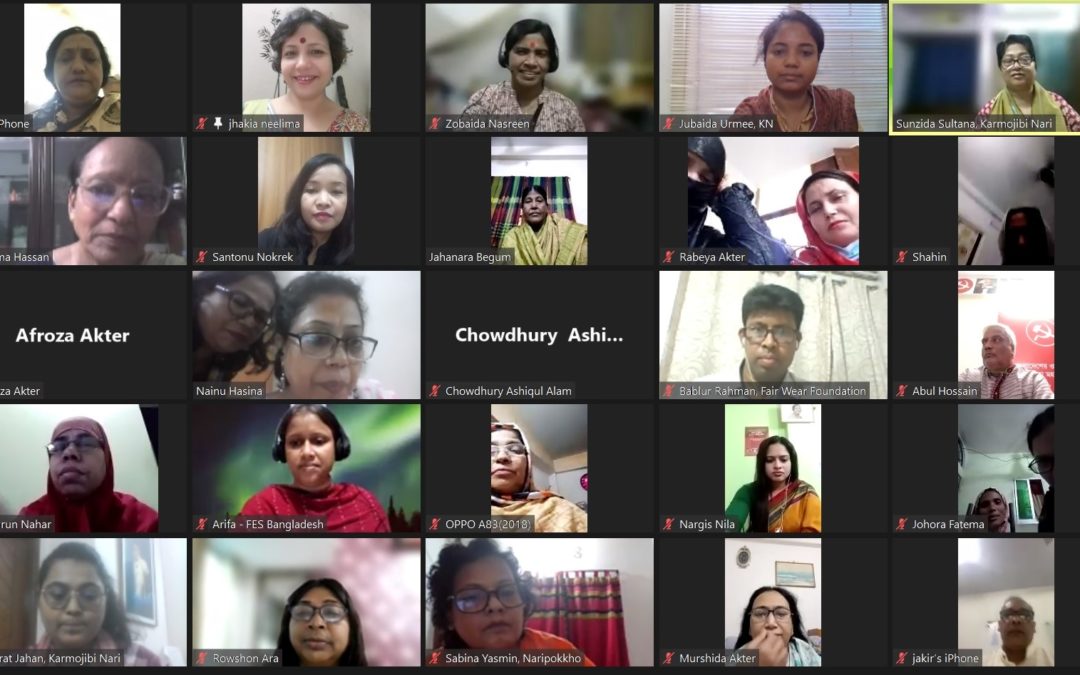
Nov 12, 2021 | News and Events, Press Release
অপ্রাতিষ্ঠানিক খাতের নারীশ্রমিকদের অবদানকে তুলে ধরতে এবং তাদের অধিকার-মর্যাদা প্রতিষ্ঠার লক্ষে’ বিউটি পার্লার ও নন-ক্লিনিক্যাল স্বাস্থ্য সেবা কর্মীদের উপর পরিচালিত গবেষণার ওপর মতবিনিময় সভা অপ্রাতিষ্ঠানিক খাতে কর্মীদের কর্মসংস্থান সম্পর্কিত অধিকার আইন দ্বারা নিশ্চিত করতে হবে
নারী শ্রমিক কন্ঠ আজ ১১ নভেম্বর, ২০২১ বিকাল ৩.০০ ঘটিকায় অপ্রাতিষ্ঠানিক খাতে নারী শ্রমিকদের অবদানকে তুলে ধরা এবং এই খাতের নারী শ্রমিকদের অধিকার মর্যাদা প্রতিষ্ঠার লক্ষ্যে বিউটি পার্লার ও হাসপাতালের কর্মীদের ওপর কড়া গবেষণা এর ওপর অনলাইন মত বিনিময় সভার (Study Sharing Consultation) আয়োজন করে
KN_Care Economy Workers_Presentation | Post press release _Karmojibi Nari





